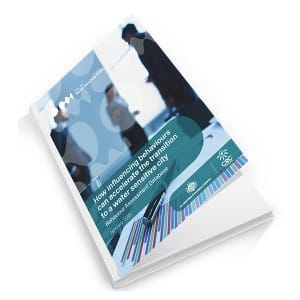New publication: How influencing behaviours can accelerate the transition to a water sensitive city
 Understanding water pollution behaviours and encouraging the public to reduce individual and collective water footprints are key goals for organisations in creating water sensitive cities.
Understanding water pollution behaviours and encouraging the public to reduce individual and collective water footprints are key goals for organisations in creating water sensitive cities.
To understand the reasons why people choose or ignore certain waterwise behaviours, building up a comprehensive database of common practices and social demographics of respondents is a useful step. This will assist in planning future waterwise campaigns.
With this in mind, the report – How influencing behaviours can accelerate the transition to a water sensitive city: Behaviour Assessment Database – has been compiled as part of Accelerating to Water Sensitive Cities by Influencing Behaviour (Project A2.2) by Dr Haywantee Rumi Ramkissoon, Dr Liam Smith and Sarah Kneebone.
Data from a nationally-representative survey of 5,194 people was used to build a profile of residents and water professionals taking part in water-sensitive or polluting behaviours.
Dr Ramkissoon said the main objective of the database was to present details on the percentage of respondents who are performing or not performing certain behaviours such as saving water by having shorter showers or installing raingardens.
The main goal of the research project is to develop and test practical methods to educate residents in each state and territory on desirable water-saving behaviours.
Download the report here.